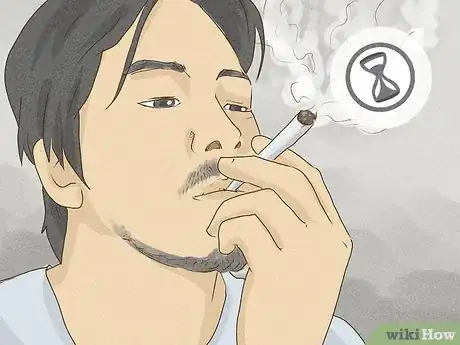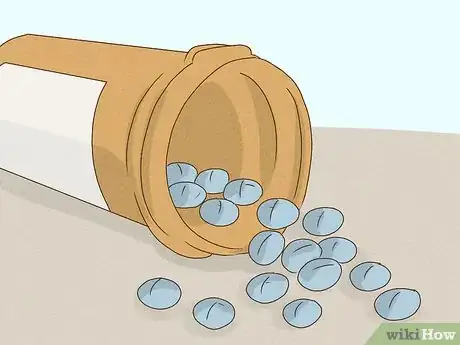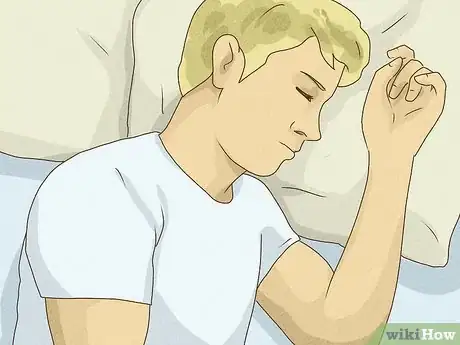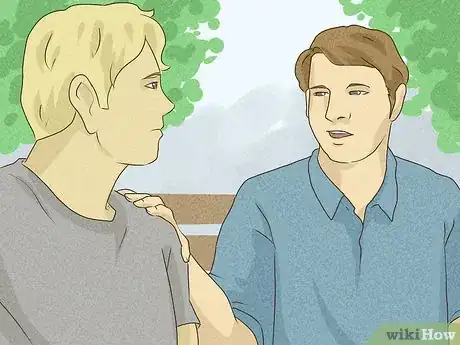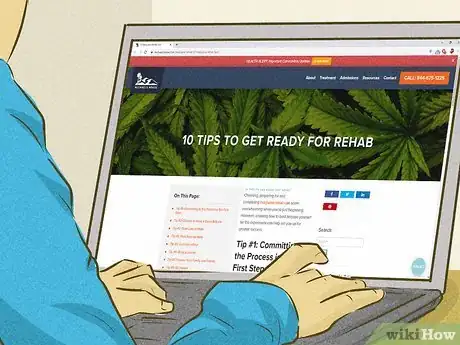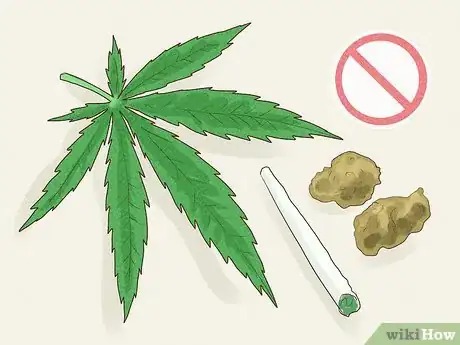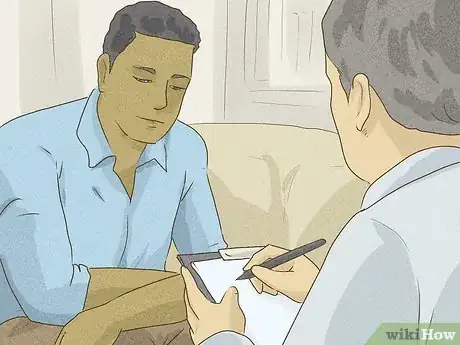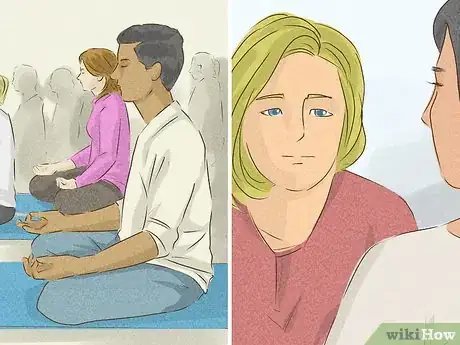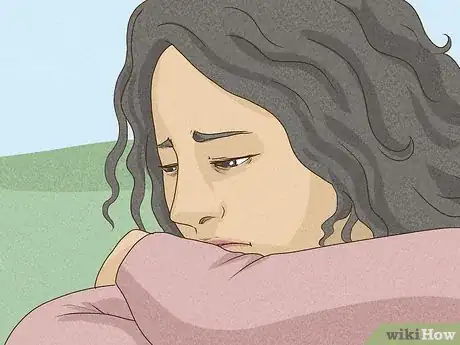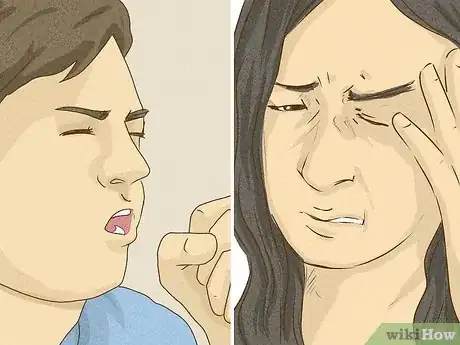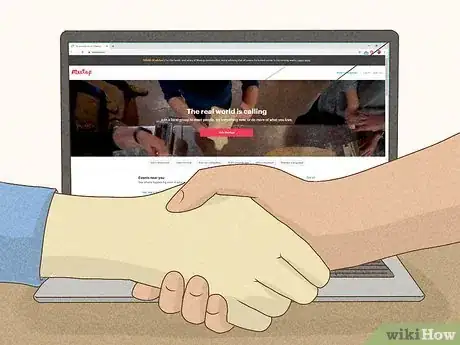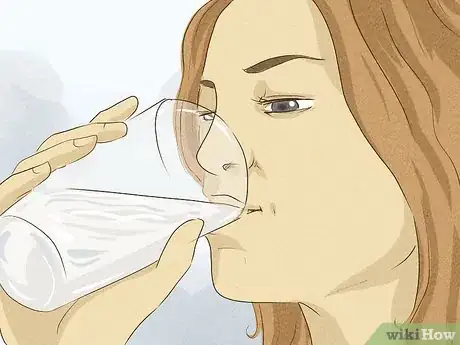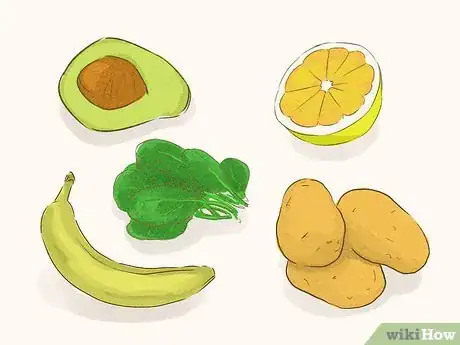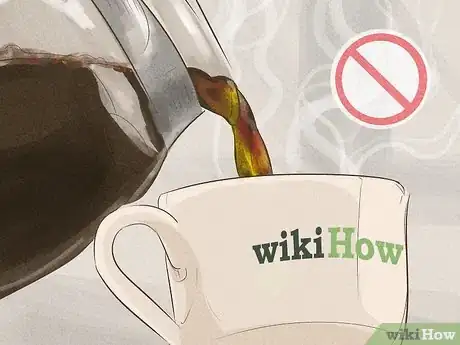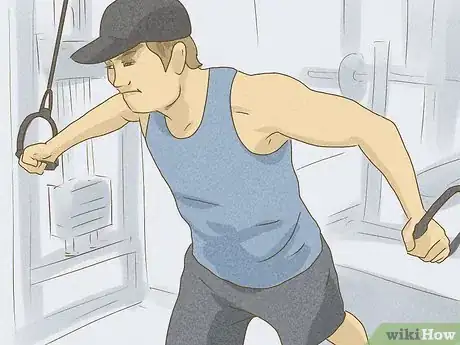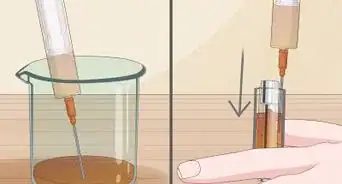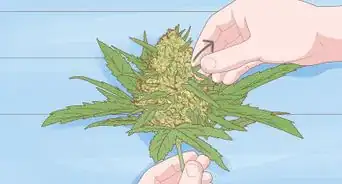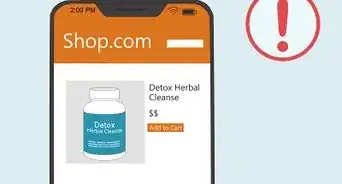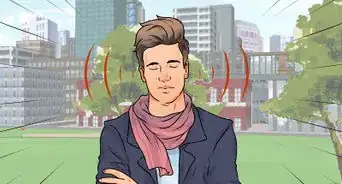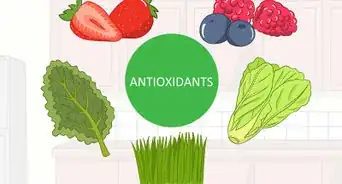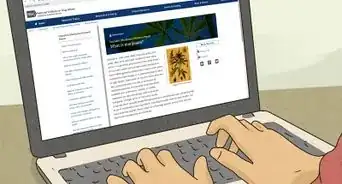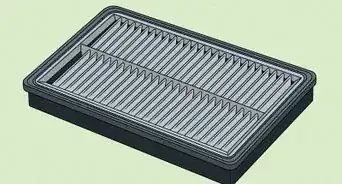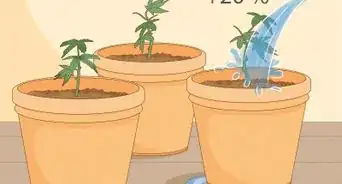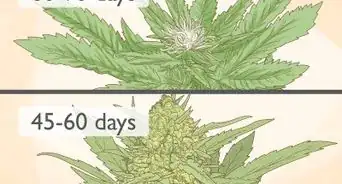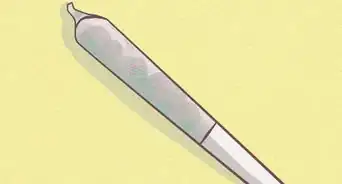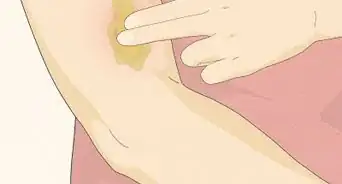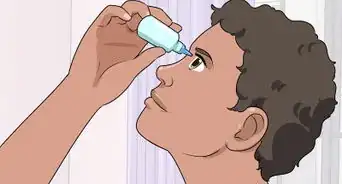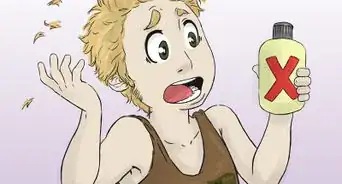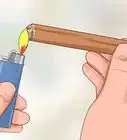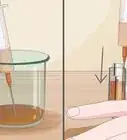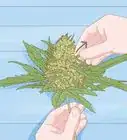This article was co-authored by Tiffany Douglass, MA. Tiffany Douglass is the Founder of Wellness Retreat Recovery Center, a JCAHO (Joint Commission on Accreditation of Healthcare Organizations) accredited drug and alcohol treatment program based in San Jose, California. She is also the Executive Director for Midland Tennessee at JourneyPure. She has over ten years of experience in substance abuse treatment and was appointed a Global Goodwill Ambassador in 2019 for her efforts in residential addiction treatment. Tiffany earned a BA in Psychology from Emory University in 2004 and an MA in Psychology with an emphasis on Organization Behavior and Program Evaluation from Claremont Graduate University in 2006.
There are 13 references cited in this article, which can be found at the bottom of the page.
This article has been viewed 952,395 times.
It is virtually impossible to instantly sober up after a marijuana high. The chemical delta-9-tetrahydrocannabinol (THC) is the part of weed that makes you high, and it can vary greatly from plant to plant, often depending on how it's grown, processed, and stored; that means that how it affects you can vary greatly. You can, however, do a few things to help bring down your high. In addition, you can take steps to give up marijuana permanently, so you don't find yourself in this situation in the future.
Steps
Mitigating the Effects of a High
-
1Know how long it can last. A typical high will wear off in about three hours, with the main effects spiking about 30 minutes after you smoked. However, when you eat cannabis or take too much, the effect can take longer to wear off. Highs can last as long as six hours or more. They can also be unpredictable if the cannabis has other drugs mixed in. If you took an exceptionally high dose of cannabis, your high can last much longer.
- Taking too much can happen in cases where you are eating cannabis, and subsequently eat too much because it doesn't take effect as quickly as you thought it would.
- In fact, the drug can stay in your body for up to two days.[1]
-
2Ask about a sedative for panic attacks. Some people want to come off their high because they unexpectedly became paranoid or had a panic attack. You can't hurry up your high, but you may be able to take a sedative in the benzodiazepine class if you have a prescription for them (and only if you have a prescription for them).[2]
- Always talk to your doctor before mixing prescription drugs with recreational drugs. Your doctor can say if they're safe for you.
Advertisement -
3Sleep it off. Because highs can last so long, one of the best things you can do is sleep it off. Of course, if you're having a panic attack, that can be difficult, but that's where the sedative can be helpful.[3]
-
4Ask someone to be with you. You need to keep yourself from being injured when your high, and having someone around can help.[4] In addition, if you start to panic, having someone to talk to can make the situation easier.
Sobering Up for Good
-
1Commit to sobering up. The best way you can help yourself is to commit to getting off weed. If you're not committed, no one else can make you do it. It has to come from you.[5]
- However, take it step-by-step. Maybe the first commitment you make to yourself is finding a rehab program. Maybe the second commitment you make is going to the rehab program. Choose steps you can take day-by-day.[6]
-
2Fight the addiction. Contrary to popular belief, you can get addicted to marijuana. The high you get from marijuana is what causes some people to get addicted—they want to recreate that feeling. For everyday users, about a quarter to a half become addicted to the drug.[7]
-
3Get help. It's not easy to quit any kind of drug on your own. Addiction is a chronic condition for many people and it requires a number of services that hug the patient and provide them with the support that they need. Find a program out there that can help you. If you need a break from your life, try a rehab program, which can separate you from a lifestyle that contributes to your smoking habit for awhile.[8] If you have good support from your family, try a local group like Marijuana Anonymous.[9]
- Be open and honest about your addiction with your family if they're supportive so they can help you.[10]
- The government provides resources for helping you get off drugs. For instance, you can use the government website SAMHSA to find a rehab center that's right for you. SAMHSA is the Substance Abuse and Mental Health Services Administration.[11]
- Look into addiction counseling, peer support groups, pharmacotherapy, and psychotherapy. Some or all of these services may be needed to get you into recovery.
-
4Learn how to cope. Using a drug like marijuana is often a way to escape problems. Therefore, to help you get off the drug, you need to learn how to deal with stress without reaching for the drug. Rehabs and groups for addicts can be helpful, but you can also learn some coping mechanisms on your own.[12]
- One way to help you cope with stress is to talk about it with people you trust. Even if you can't come up with a solution, sometimes just getting the stress off your chest by talking can help relieve it.[13]
- Don't be afraid to take a break from a stressful situation. If something is really stressing you out, such as a work problem, don't be afraid to walk away from it for a bit. Take a moment to take a few deep breaths and clear your head. In addition, don't be afraid to take a break from things that stress you out in your life. For instance, if you find watching the news stressful, maybe you should skip it for awhile.[14]
-
5Expect psychological side effects. If you've been smoking weed for a long time, you will likely experience some side effects when you stop. Some people have trouble sleeping after stopping weed, while others may experience depression or excessive anger. Another withdrawal effect is your dreams may become more vivid, as using weed can make your dreams less vivid.[15]
-
6Expect physical side effects. You'll also likely experience some physical side effects of withdrawal. You may develop headaches for awhile or experience night sweats. You also may cough up mucus. Finally, you may have a lowered appetite, as well as have shaking or dizziness.[16]
-
7Make new friends. If all of your friends also smoke, you're likely to fall back into old habits if you continue to hang out with them. Try making some new friends with whom you can enjoy other activities. For instance, you could join local groups that have an interest in the same hobbies as you.[17] You could volunteer or join an exercise class. Find people who like some of the same things you do, minus the weed.[18]
- Try looking on meetup.com for groups in your area.
-
8Hydrate yourself. Drinking plenty of water may help flush some of the marijuana out of your system. In addition, being hydrated can make you feel better over all.[19]
-
9Eat potassium. If you are having problems with extra sweating, eat foods high in potassium. Try potatoes with the skin on, melons, bananas, citrus fruits, and dark, leafy greens.[22]
-
10Skip caffeine. Because detoxing can cause insomnia, you don't want to add to the problem. While you're trying to get your sleep schedule back to normal, skip the coffee.[23]
-
11Try exercising. Exercising can give you a natural high to help put you in a good mood. In addition, it keeps you healthy, helping you to heal faster. Try exercising several times a week to help mitigate your depression and sleeplessness.[24]
- If you experience a craving, going for a run, riding your bike, or working out can be a helpful way to distract yourself.[25]
Expert Q&A
Did you know you can get expert answers for this article?
Unlock expert answers by supporting wikiHow
-
QuestionHow do I stop smoking weed?
 Tiffany Douglass, MATiffany Douglass is the Founder of Wellness Retreat Recovery Center, a JCAHO (Joint Commission on Accreditation of Healthcare Organizations) accredited drug and alcohol treatment program based in San Jose, California. She is also the Executive Director for Midland Tennessee at JourneyPure. She has over ten years of experience in substance abuse treatment and was appointed a Global Goodwill Ambassador in 2019 for her efforts in residential addiction treatment. Tiffany earned a BA in Psychology from Emory University in 2004 and an MA in Psychology with an emphasis on Organization Behavior and Program Evaluation from Claremont Graduate University in 2006.
Tiffany Douglass, MATiffany Douglass is the Founder of Wellness Retreat Recovery Center, a JCAHO (Joint Commission on Accreditation of Healthcare Organizations) accredited drug and alcohol treatment program based in San Jose, California. She is also the Executive Director for Midland Tennessee at JourneyPure. She has over ten years of experience in substance abuse treatment and was appointed a Global Goodwill Ambassador in 2019 for her efforts in residential addiction treatment. Tiffany earned a BA in Psychology from Emory University in 2004 and an MA in Psychology with an emphasis on Organization Behavior and Program Evaluation from Claremont Graduate University in 2006.
Founder, Wellness Retreat Recovery Center
-
QuestionWhat home remedy can I use to get weed out of my system in one day?
 Chris M. Matsko, MDDr. Chris M. Matsko is a retired physician based in Pittsburgh, Pennsylvania. With over 25 years of medical research experience, Dr. Matsko was awarded the Pittsburgh Cornell University Leadership Award for Excellence. He holds a BS in Nutritional Science from Cornell University and an MD from the Temple University School of Medicine in 2007. Dr. Matsko earned a Research Writing Certification from the American Medical Writers Association (AMWA) in 2016 and a Medical Writing & Editing Certification from the University of Chicago in 2017.
Chris M. Matsko, MDDr. Chris M. Matsko is a retired physician based in Pittsburgh, Pennsylvania. With over 25 years of medical research experience, Dr. Matsko was awarded the Pittsburgh Cornell University Leadership Award for Excellence. He holds a BS in Nutritional Science from Cornell University and an MD from the Temple University School of Medicine in 2007. Dr. Matsko earned a Research Writing Certification from the American Medical Writers Association (AMWA) in 2016 and a Medical Writing & Editing Certification from the University of Chicago in 2017.
Family Medicine Physician
-
QuestionI am experiencing memory gap effects and my senses feel delayed. It's been two days — how long until this wears off?
 Chris M. Matsko, MDDr. Chris M. Matsko is a retired physician based in Pittsburgh, Pennsylvania. With over 25 years of medical research experience, Dr. Matsko was awarded the Pittsburgh Cornell University Leadership Award for Excellence. He holds a BS in Nutritional Science from Cornell University and an MD from the Temple University School of Medicine in 2007. Dr. Matsko earned a Research Writing Certification from the American Medical Writers Association (AMWA) in 2016 and a Medical Writing & Editing Certification from the University of Chicago in 2017.
Chris M. Matsko, MDDr. Chris M. Matsko is a retired physician based in Pittsburgh, Pennsylvania. With over 25 years of medical research experience, Dr. Matsko was awarded the Pittsburgh Cornell University Leadership Award for Excellence. He holds a BS in Nutritional Science from Cornell University and an MD from the Temple University School of Medicine in 2007. Dr. Matsko earned a Research Writing Certification from the American Medical Writers Association (AMWA) in 2016 and a Medical Writing & Editing Certification from the University of Chicago in 2017.
Family Medicine Physician
References
- ↑ http://cms.bsu.edu/about/administrativeoffices/healtheducation/healthwellnesstopics/marijuana
- ↑ http://www.nlm.nih.gov/medlineplus/ency/article/000952.htm
- ↑ http://www.huffingtonpost.com/2014/06/04/high-on-marijuana-edibles_n_5446062.html
- ↑ http://www.nlm.nih.gov/medlineplus/drugabuse.html
- ↑ http://www.michaelshouse.com/marijuana-rehab/10-marijuana-rehab-tips/
- ↑ http://www.michaelshouse.com/marijuana-rehab/10-marijuana-rehab-tips/
- ↑ http://teens.drugabuse.gov/drug-facts/marijuana
- ↑ Tiffany Douglass, MA. Substance Abuse Treatment Specialist. Expert Interview. 10 March 2020.
- ↑ https://www.marijuana-anonymous.org/how-it-works/twelve-steps
- ↑ Tiffany Douglass, MA. Substance Abuse Treatment Specialist. Expert Interview. 10 March 2020.
- ↑ https://findtreatment.samhsa.gov/
- ↑ http://www.dependency.net/learn/marijuana/
- ↑ http://www.cdc.gov/violenceprevention/pub/coping_with_stress_tips.html
- ↑ http://www.cdc.gov/violenceprevention/pub/coping_with_stress_tips.html
- ↑ https://www.marijuana-anonymous.org/literature/pamphlets/detoxing-from-marijuana
- ↑ https://www.marijuana-anonymous.org/literature/pamphlets/detoxing-from-marijuana
- ↑ Tiffany Douglass, MA. Substance Abuse Treatment Specialist. Expert Interview. 10 March 2020.
- ↑ http://www.dependency.net/learn/marijuana/
- ↑ http://www.michaelshouse.com/marijuana-rehab/10-marijuana-rehab-tips/
- ↑ http://www.mayoclinic.org/healthy-lifestyle/nutrition-and-healthy-eating/in-depth/water/art-20044256
- ↑ https://www.marijuana-anonymous.org/literature/pamphlets/detoxing-from-marijuana
- ↑ https://www.marijuana-anonymous.org/literature/pamphlets/detoxing-from-marijuana
- ↑ https://www.marijuana-anonymous.org/literature/pamphlets/detoxing-from-marijuana
- ↑ https://www.marijuana-anonymous.org/literature/pamphlets/detoxing-from-marijuana
- ↑ Tiffany Douglass, MA. Substance Abuse Treatment Specialist. Expert Interview. 10 March 2020.
About This Article
To sober up from weed, try drinking a couple glasses of water, which will help flush the active chemicals out of your system. Lie down and sleep, if you can, so when you wake up, the effects of the cannabis will be reduced or gone. If you’re feeling anxious, consider asking someone to sit with you until you sober up for your peace of mind. Most of all, try to stay calm and remember that the effects are temporary and will wear off within a few hours. For more tips from our Medical co-author, including how to stay sober for good if you’re dependent on weed, read on!
